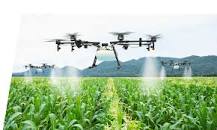Drone farming leverages unmanned aerial vehicles (UAVs) equipped with Multipurpose sensors and cameras to collect detailed leaf-level imagery of your fields. Combined with artificial intelligence (AI), data ranges from plant and soil health to pest Attack and yield potential, empowering farmers to make informed decisions that optimize their operations and boost their bottom

Unlocking Agricultural Efficiency: The Advantages of Drone Farming
- Increased Yield and Quality, Precise insights into crop health and crop threats allow for targeted interventions, leading to improved yields and higher-quality produce.
- Drone Farming Reduces Costs and Waste Efficient resource allocation minimizes inputs like water, fertilizer, and pesticides, saving money and protecting the environment.
- Improved Labor Efficiency, Drones farming automate time-consuming tasks like field scouting and monitoring, freeing up farmers for other critical activities.
- Enhanced Sustainability, Drone Farming provides Data-driven insights enable farmers to adopt sustainable practices like precision irrigation and cover cropping.
- Reduced Risk, Early detection of problems like pests and diseases helps prevent widespread damage and financial losses.
The Ins and Outs of Drone Farming Technology in Precision Agriculture:
- High resolution aerial imagery and data, Capture detailed insights about your fields from the air.
- Powerful data analysis tools, Gain actionable insights from your data with user-friendly analytics dashboards from any device.
- Data integration with existing tools, Drone Farming Connect Acre Forward data with your farm management software for seamless data flow.
From Seed to Harvest: Exploring the Multifaceted Applications of Drones in Modern Farming:
Drone farming has a wide range of applications, including
- Crop Monitoring, Monitor plant health, growth stages, and stress levels to identify potential problems early on.
- Precision Spraying, Apply pesticides, herbicides, and fertilizers with pinpoint accuracy, minimizing waste and environmental impact.
- Irrigation Management, Drone Farming Optimize water usage by precisely mapping soil moisture levels and tailoring irrigation accordingly.
- Yield Prediction, Drone Farming Forecast yields based on real-time data to improve planning and resource allocation.
Conclusion:
Drone farming is no longer a futuristic concept, it is a readily available tool that can revolutionize your agricultural operations. By embracing this technology and leveraging the power of data, you can unlock a new era of precision, efficiency, and sustainability in your farming practices.
FAQs
How are drones used in farming?
The photos and real-time coverage drones provide enable farmers to inspect irrigation equipment, monitor pesticides and fertilizers , and gather plant and environmental data. This allows them to make informed, immediate decisions about issues concerning output, management, and even overall crop health
Are There Any Specific Licenses Required To Fly Agricultural Drones?
In Many Countries specific licenses or certifications may be required to legally fly agricultural drones, especially if they are used for commercial purposes.
How can drone farming help you increase your productivity?
Drones that can scan land more quickly and effectively save farmers time and allow them to spot problems faster. This allows for faster response to problems and minimizing crop loss. Drones also enable more efficient distribution of pesticides and fertiliz


